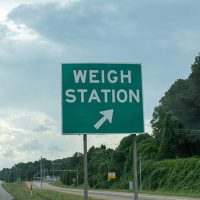Trucking Weigh Stations Play An Important Safety Role

Have you ever driven on an interstate highway, and you see a sign that says that there is a truck weigh station? Ever wondered what these actually are? If you just drive a normal car, you may think these don’t matter. They don’t matter to the extent that you don’t need to worry about them-but they do matter because they play an important role in safety on the roadways, when it comes to large commercial trucks.
Why Do We Need Them?
When a truck is being loaded, there is every opportunity to make sure the truck complies with federal and state regulations. People at the warehouse or the headquarters, wherever the truck is being loaded, can check tires and other mechanical equipment and can ensure that the truck is loaded properly, and not being overloaded.
But once that truck hits the road, often for many days on end, the truck and its driver are essentially on their own.
Who will make sure that the truck continues to be in compliance with state and federal regulations? Couldn’t a truck driver just ignore mechanical problems? A truck driver may not even have the technical knowledge to look at a tire and see that it is inflated properly and fully, or to make sure that a truck is not overloaded. What’s to stop a truck driver from messing with the electronics that track how long the driver is supposed to drive at one time?
What the Weigh Stations Do
That is the role of the trucking weigh station. It is a temporary point where government officials will inspect a truck for all of these things and more, to ensure that the truck is safe, maintained properly, and hasn’t been altered.
The stations are fully equipped to handle and fix mechanical problems if needed, with properly certified repair people, to avoid trucks from being sent on the road when they aren’t mechanically sound.
The inspectors at the stations inspect for compliance with both federal, and state laws. They will look inside the cargo bay, and other areas of the truck. They will even do visual inspections of the drivers themselves, looking for signs of fatigue or illness, anything which could affect the drivers ability to operate the vehicle safely. They will also check the driver’s certifications and licenses, to make sure they are current.
Many stations are close to state borders, so state officials can prevent a truck that is not in compliance with safety regulations from continuing to drive on that state’s highways.
Most companies don’t like stopping—stopping slows their deliveries, which costs them money. But all truck drivers have to stop at the stations, or risk being penalized by the government. In some cases, drivers or companies with good safety records, can get a pass in advance to bypass the stations.
Involved in a trucking accident? Contact our Rhode Island personal injury lawyers at Robert E. Craven & Associates at 401-453-2700 today.
Sources:
schneiderjobs.com/blog/what-are-weigh-stations-for
fdot.gov/mcsaw/weighstationlisting.shtm
